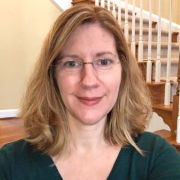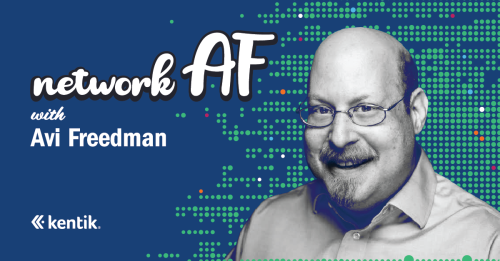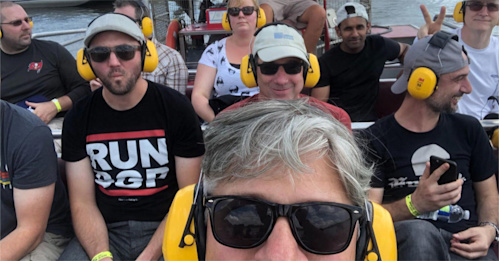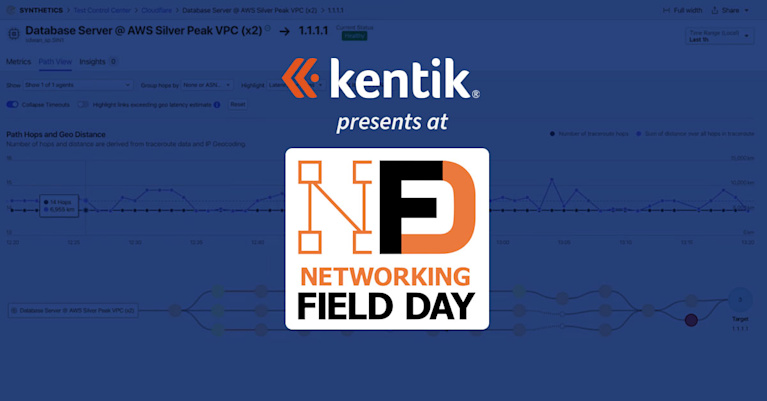Network AF, Episode 3: Uniting networking pros with Salesforce’s Janine Malcolm
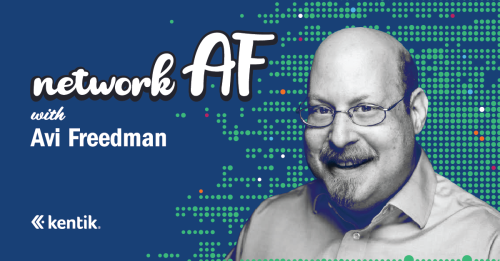
Summary
In the latest episode of Network AF, you’ll meet Janine Malcolm, director of network engineering at Salesforce. Here’s a recap of the podcast, where Janine talks about her journey to get to where she is today and how she became interested in networking itself.
If you’ve ever thought networking is bewildering as a newcomer, you’re not alone. In episode 3 of Network AF, meet Janine Malcolm, the director of network engineering at Salesforce. She joins podcast host Avi Freedman to chat about some of the experiences she’s had throughout her career and how to make network engineering a more accessible profession.
At Salesforce, Janine is currently focused on uniting groups of people as one overall network engineering team. On the podcast, she and Avi cover this topic, as well as mentorship opportunities, how to make the workplace a more respectful and equal place regardless of a person’s background, and lessons learned through experimentation and failure.
Before her days at Salesforce, Janine worked her way up as a customer service representative at DIGEX (in dial-up), helping people to understand their web hosting and ISP problems. Gradually moving up from T1 to T2 to T3 support lines, she eventually learned enough to move server-side. To her this was an eye-opening experience. And two years later, she moved to the network engineering side, proclaiming how cool it was to learn to code in Perl and get to move so much data around.
It’s also worth pointing out, the original catalyst to jump start Janine’s interest in technology was none other than her grandfather. She mentions him introducing her to computers around age four or five.
On mentorship
Reinforcing that her path to success was filled with a strong support system, Janine says mentoring and pairing up with colleagues to solve networking problems was one of the greatest assets. She also credits DIGEX for having many fantastic women who acted as wonderful role models and mentors.
Having the ability to set up buddy systems where people sit right next to each other setting up routers, troubleshooting problems and learning together allowed her greater opportunity to ask questions in an open environment. She still feels that 70% of how people learn is just sitting there, experiencing problems, mentoring by sharing knowledge and helping with an open mind. It’s something that she tries to emulate with the teams she manages and builds, in addition to cross-training to fill gaps in knowledge. (It’s at this point in the podcast that several jokes are made at the expense of FORTRAN and how white space is not syntax.)
On the importance of networks, which many say are just hardware, Janine and Avi both share anecdotes about how there’s just software. Networks, of course, are constituted of hardware, but there’s always software underlying that ensures that hardware functions as intended. Which is a huge barrier to entry for someone in college or even just someone interested in network engineering when it comes to understanding the underlying technology that powers it all. Avi shares that a friend at IBM likes to say, “Without the network, there is no cloud,” or the Zen version, “Networks are the water of the clouds, the connective tissue, what clouds are made of.”
On “blowing up the internet” and “bubble-gumming”
Avi and Janine also discuss “blowing up the internet” and how this perspective has changed over time. For instance, in the past, a network engineer may have been encouraged or less concerned with a minor interruption of service in order to test and experiment. It was less damaging then. But now in the SaaS world we live in, reliability and hyper-available services are key. That lapse in service could cause a loss of trust when the end-user needs the functionality most. Avi jokes that if someone at Kentik said, “Hey I might try this thing and it might explode the internet, it might take our service down,” that he would laugh while definitively replying “Oh no.”
This isn’t to say that experimentation is dead. Far from it actually, but now different methods are needed to ensure reliability. Whether it comes from attempting new automations that can prevent service interruptions or setting up test environments in smaller batches.
To this point Avi discusses with Janine how when they started there was a lot of “bubble-gumming” status routes and nobody knew exactly what everything did or why it was part of the network. Now though, services like Kentik and others are available so that people know all the details of their network operations and traffic, understanding that if they turn off a route they know what part of the service it will impact. In the past this was a much more laborious process involving turning off services, rebooting and digging for information manually. So experimenting is still an active element of network engineering, but now it happens in ways with less potential to hurt the business’ reputation.
On Salesforce
While Janine works with many vendors and thinks it is fascinating to solve customer problems, she is doing slightly different things in her network engineering role at Salesforce these days.
She’s focused on making sure the network is not only running efficiently, but that it provides a comfortable layer upon which to build applications that run smoothly over the network. She’s helping to fine-tune their networks to work based on what is and is not working for their customers.
Avi and Janine and Avi also discuss Salesforce and the company’s approach to network management, like if they use the cloud and more traditional on-premises routers and switches. And Janine talks about Salesforce employing a hybrid approach to managing their network.
When Avi asks Janine what trends and buzzwords she is tired of hearing, or by contrast is fascinated by, she immediately and enthusiastically responds with the phrase, “software-defined” and that she is really sick of it. As far as both Avi and Janine are concerned, software defines anything and everything, it’s all software.
There’s a lot more packed into this podcast episode, including Janine’s advice for future generations of network engineers, so be sure to give it a listen.

